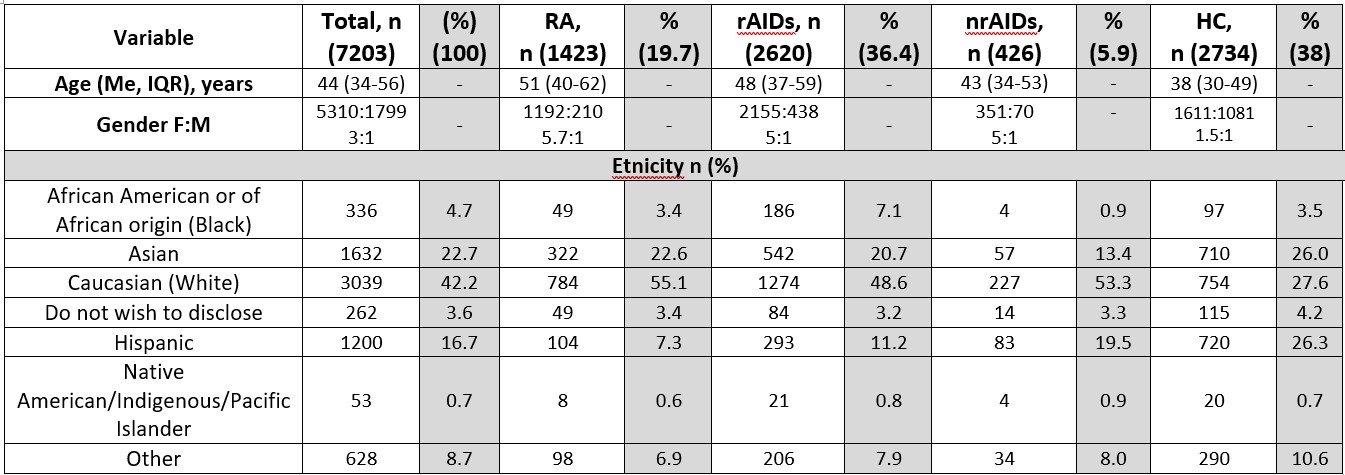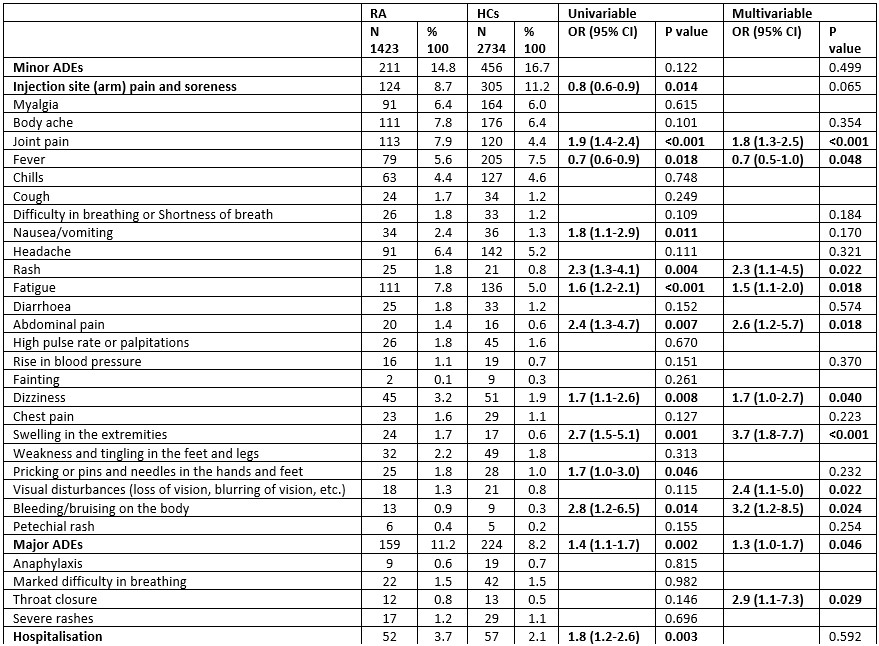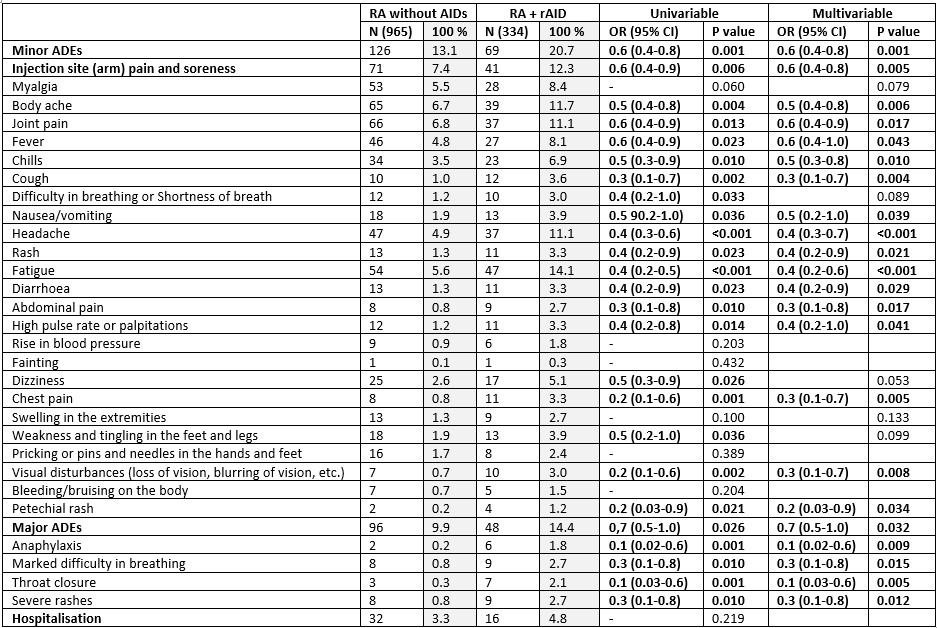Session Information
Date: Monday, November 13, 2023
Title: (1264–1307) RA – Diagnosis, Manifestations, and Outcomes Poster II
Session Type: Poster Session B
Session Time: 9:00AM-11:00AM
Background/Purpose: COVID-19 vaccines have been proven to be safe in the healthy population. Data on longer-term AEs in people with autoimmune diseases (AIDs), including rheumatoid arthritis (RA) are lacking. COVID-19 vaccination-related AEs in patients with RA, rheumatic (rAIDs), and non-rheumatic AIDs (nrAIDs) and healthy controls (HC) greater than seven days post-vaccination were assessed in the COVID-19 Vaccination in Autoimmune Diseases (COVAD)-2 study.
Methods: The COVAD-2 study group comprised 157 collaborators across 106 countries. The study was conducted between February and June 2022. An online survey captured self-reported data related to COVID-19 vaccination-related AEs in RA, AIDs, and HCs. rAIDs included connective tissue diseases, inflammatory myopathies and inflammatory arthritis. nrAIDs comprised inflammatory bowel disease, multiple sclerosis etc. We compared COVID-19 vaccination-related delayed AEs among RA, other rAIDs, nrAIDs and HCs, adjusting for age, gender and ethnicity, using multivariable binary regression. Statistically significant results are reported.
Results: Among 7203 participants, 1423 (19.7%) RA, 2620 (36.4%) rAIDs, 426 (5.9%) nrAIDs and 2734 (38%) HCs were included from a total of 17612 respondents, with 75% female and 42.2% Caucasian (Table 1). People with RA were older [median age 51 (40-62); rAIDs, 48 (37-59); nrAIDs 43 (34-53); HC 38 (30-49)]. When compared to HCs, people with RA reported higher overall major AEs in the multivariable analyses [OR 1.3 (1.0-1.7)], especially throat closure [OR 2.9 (1.1-7.3)], and increased number of several minor AEs (Table 2). People with RA had fewer reported episodes of fever [OR 0.7 (0.5-1.0)]. When compared to rAIDS, people with RA had fewer episodes of rash [OR 0.6 (0.4-1.0)], and when compared to nrAIDs, had increased reported injection site pain [OR 1.7 (1.0-2.6)], myalgia [OR 1.9 (1.1-3.4)], body ache [OR 2.2 (1.3-3.7)], joint pain [OR 2.7 (1.5-4.8)], fever [OR 1.8 (1.0-3.3)] and swelling of extremities [OR 4.9 (1.1-21.4)]. ChadOx1 nCOV-19 (Oxford/ AstraZeneca) led to significantly increased minor AEs in the RA group [OR 1.9 (1.4-2.6)], compared to other vaccines, while the Moderna vaccination was associated with increased hospitalisation in people with RA [OR 2.4 (1.3-4.3)]. People with active RA had increased major AEs [OR 1.8 (1.1 – 3.0)] and hospitalisation [OR 4.1 (1.3 – 13.3)], compared to inactive RA. RA patients without autoimmune comorbidities had significantly fewer major and minor AEs compared to those with other rAIDs (Table 3). People with RA and mental health diagnoses had increased reported chills [OR 1.8 (1.1 – 3.0)] and chest pain [OR 2.5 (1.1 – 6.0)]. Decreased incidence of hospitalisation was seen in patients taking methotrexate [OR 0.5 (0.3-0.9)] or TNF inhibitors [OR 0.1 (0.02-0.9)] compared to hydroxychloroquine, sulfasalazine and leflunomide.
Conclusion: COVID-19 vaccination is safe with minimal to no risks of delayed AEs in patients with RA compared to HCs, and fewer compared to other rAIDs. Active RA and presence of co-existent rAIDs were both associated with increased risk of delayed AEs.
To cite this abstract in AMA style:
Dey M, Doskaliuk B, Parodis I, Lindblom J, Wincup C, Joshi M, Dzifa D, Kadam E, Sen P, Shinjo S, Nune A, Ziade N, Chen Y, Traboco L, TORO GUTIERREZ C, Study Group C, Aggarwal R, Agarwal V, Gupta L, Nikiphorou E. COVID-19 Vaccination-related Delayed Adverse Events Among Patients with Rheumatoid Arthritis: Results from the COVAD Study [abstract]. Arthritis Rheumatol. 2023; 75 (suppl 9). https://acrabstracts.org/abstract/covid-19-vaccination-related-delayed-adverse-events-among-patients-with-rheumatoid-arthritis-results-from-the-covad-study/. Accessed .« Back to ACR Convergence 2023
ACR Meeting Abstracts - https://acrabstracts.org/abstract/covid-19-vaccination-related-delayed-adverse-events-among-patients-with-rheumatoid-arthritis-results-from-the-covad-study/



